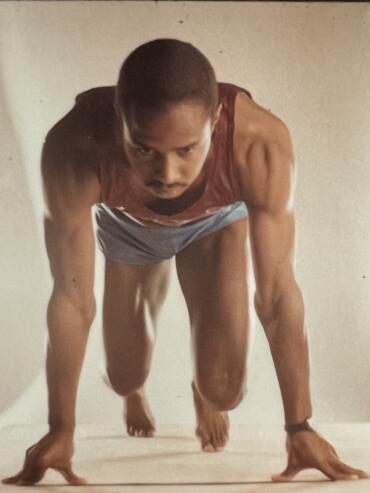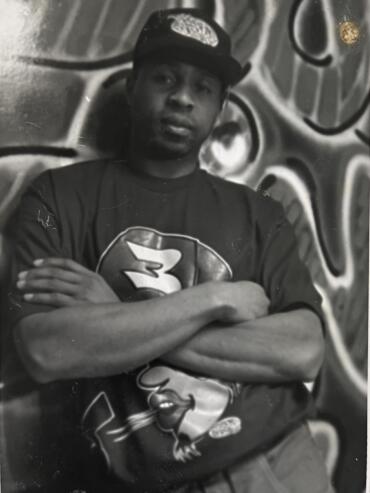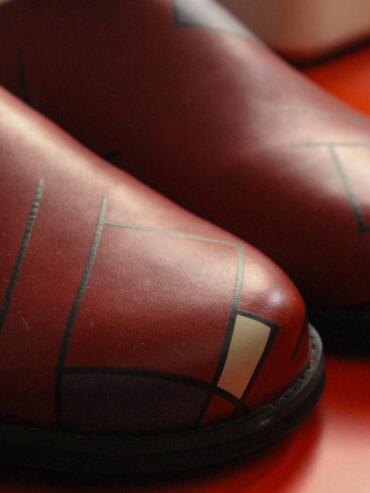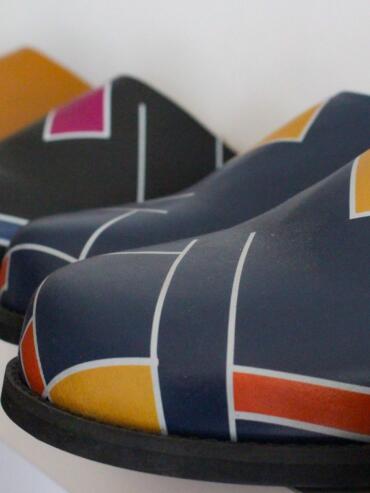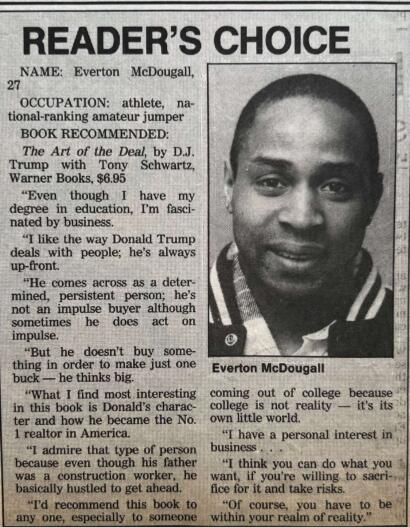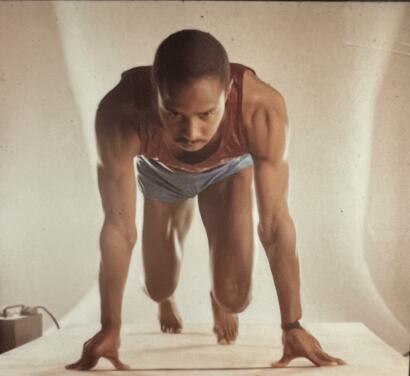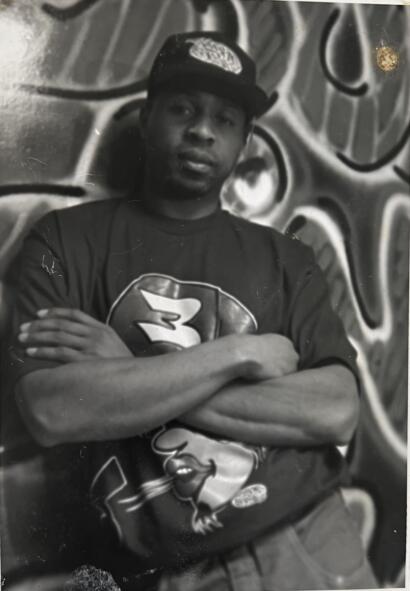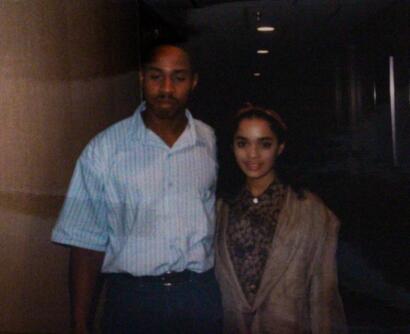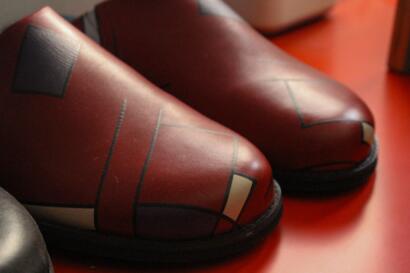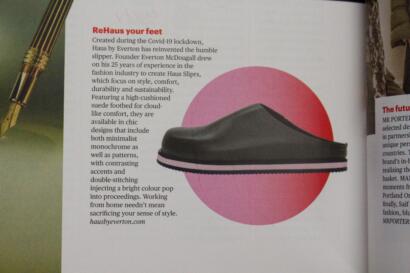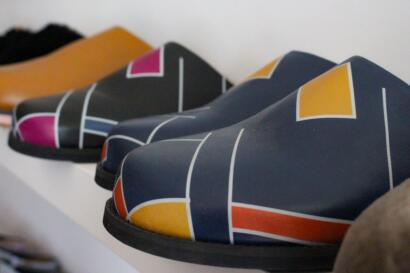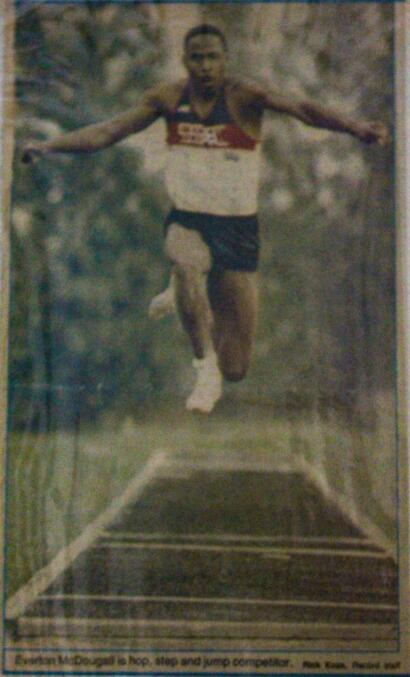June 2024
Month 20xx
Words by Elijah Jones-Young and Sam Dubiner
Charmaine Gooden
Jacob Marion
When you enter Everton McDougall’s studio, something is immediately made clear – this is a space for creativity. On the room’s farthest wall, past the rows of luxury mules and shipping boxes, a Mondrian-esque mural that McDougall painted serves as a reflection of his principles of innovation and honesty.
In the fashion industry, it’s not uncommon to cross paths with those who bear strong convictions and artistic identities. Still, even among contemporaries, Haus by Everton’s eponymous founder marches to his rhythm as a trailblazer with an eye for the unexplored. “I always thought of myself as a little out of left field,” McDougall says, and it’s his unabashed self-awareness that allowed him to stand out as a caring, thoughtful, and resourceful creative who has found success in fashion and life.
Early Life and Career
McDougall, born in Kingston, Jamaica, grew up alongside five siblings. In 1970, his family relocated to Kitchener, Ontario, where he attended Kitchener Collegiate Institute (KCI). Despite considering himself a “terrible student,” McDougall excelled in sports, particularly basketball and track and field, honing his self-discipline. Reflecting on his athletic journey, he remarks, “Being an athlete, it’s all about relying on yourself.”
After graduating from KCI in 1982, McDougall earned a scholarship to the University of Kentucky in Lexington, Kentucky for the triple jump, later transferring to Abilene Christian University in Texas, where he completed his Bachelor of Education in 1988.
In pursuit of his Olympic dreams, McDougall moved to Edmonton, Canada in 1991 to train with renowned coach Ted King. However, a significant knee injury thwarted his plans for the Barcelona 1992 Summer Olympics. Subsequently, McDougall pivoted, co-founding the streetwear boutique Colour Blind with his girlfriend.
“At that time, the hip-hop scene was booming… and there were these guys aspiring to be DJs, so I created a section for them in my store,” recalls McDougall, who describes himself as “More of an RnB kind of guy.”
Frequent trips to New York City and Los Angeles exposed McDougall to the latest trends in streetwear and rave fashion. It was during one such trip to Los Angeles in 1993 that he encountered Kikwear, a majorly influential hip-hop label that he was referred to through the Toronto-based brand Too Black Guys. McDougall’s association with Kikwear led to significant opportunities, including a role as the Canadian national manager for GSUS Sindustries, working with them for over 12 years before transitioning to private brand representation work.
After over a decade of collaborating with various brands including Kings of Indigo, Ben Sherman, Evisu Denim and Edwin Jeans, McDougall embarked on a deeply personal venture prompted by a candid remark from his girlfriend. “I was just sitting on the couch, legs not extended, and she looked at my feet and said, ‘I hate your feet,'” McDougall chuckles.
Unsatisfied with existing footwear options, McDougall identified a gap in the market and seized the opportunity to launch Haus by Everton, a luxury footwear brand combining style with functionality, drawing inspiration from Piet Mondrian and the Bauhaus movement. He says he “Wanted something with style and comfort, where you can dress up or dress down, work inside or outside, [or] go to a function.”
“I’ve been in fashion for 25-plus years. I know how to do my own stuff. I’ve done consulting for other brands; I’ve helped other brands build their company. I think it’s time to start building my own company,” McDougall reminisces.
During the COVID-19 pandemic, McDougall started the process of establishing his company. While searching for manufacturers, he considered Brazil, Mexico, China, Japan and Italy. All these potential options were met with difficulties, eventually leading him to pick Portugal as the manufacturing hub for Haus. McDougall also enlisted three friends to help jumpstart the brand, Celline Cabusora for graphic design, Darren Jarvis for website development and Ian Lee for art direction.
This special section creates a photo next to a pull-quote
McDougall embarked on a deeply personal venture prompted by a candid remark from his girlfriend
I was just sitting on the couch, legs not extended, and she looked at my feet and said, ‘I hate your feet,'” McDougall chuckles.
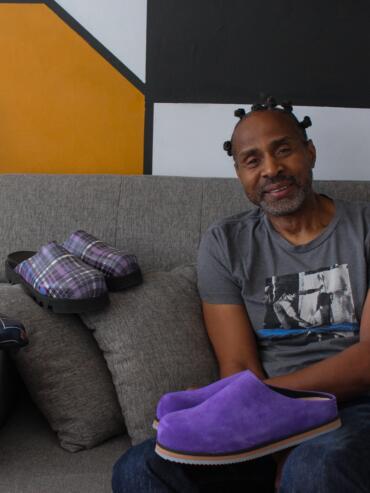
Role of Race
McDougall’s indifference to the opinions of others and his unwavering commitment to innovation are reflections of a mindset driven by self-determination and a complete refusal to let external factors, like racism, impede his progress.
“I never gave two craps about what people thought of me. I always wanted to experiment with different things,” says McDougall. “I don’t use race as a deterrent or as a crutch,” he continues. “Maybe my product wasn’t right for them – that’s okay. I’ll check out your store and see what’s right for you so when I come back next year you can’t say no to me.”
McDougall’s pragmatic perspective on the topic of racism acknowledges discrimination as an unfortunate, shared human challenge. “Let’s not be fooled by it,” he says. “Everybody’s going to experience it. It doesn’t matter if you’re Black, white, Asian, whatever, you’re gonna experience it in some form. How you get over is how you deal with it. Me? I don’t allow it to dictate my life.”
Influence and Legacy
Today, McDougall operates Haus by Everton and other side projects out of his midtown studio. You can find him with his door open in a studio decorated and documented with a lifetime of his work. A row of bags, a wall of plaques and the ornamental logos of brands he’s managed, retailed or partnered with over the last few decades.
When asked what he wants his legacy to be, McDougall says he hopes to be remembered by the ways he gives back to others. “It sounds pretty cheesy, but basically someone who cares about others… Just take care of each other.”
McDougall’s longtime friend, radio personality Tony “Master T” Young, affirms this message, saying, “The one thing about him I’ll always say is he’s a blessing. I can call him and he’s the most giving dude… We’ve always had that connection and relationship which has been great, and now I’m just so proud of him.”
Recognizing McDougall’s career and future as a culmination of strong values and years of work, Young concludes, adding, “It’s very rare that somebody can say ‘Hey, I’m going to do this,’ and they actually do it.”
At that time, the hip-hop scene was booming… and there were these guys aspiring to be DJs, so I created a section for them in my store.



